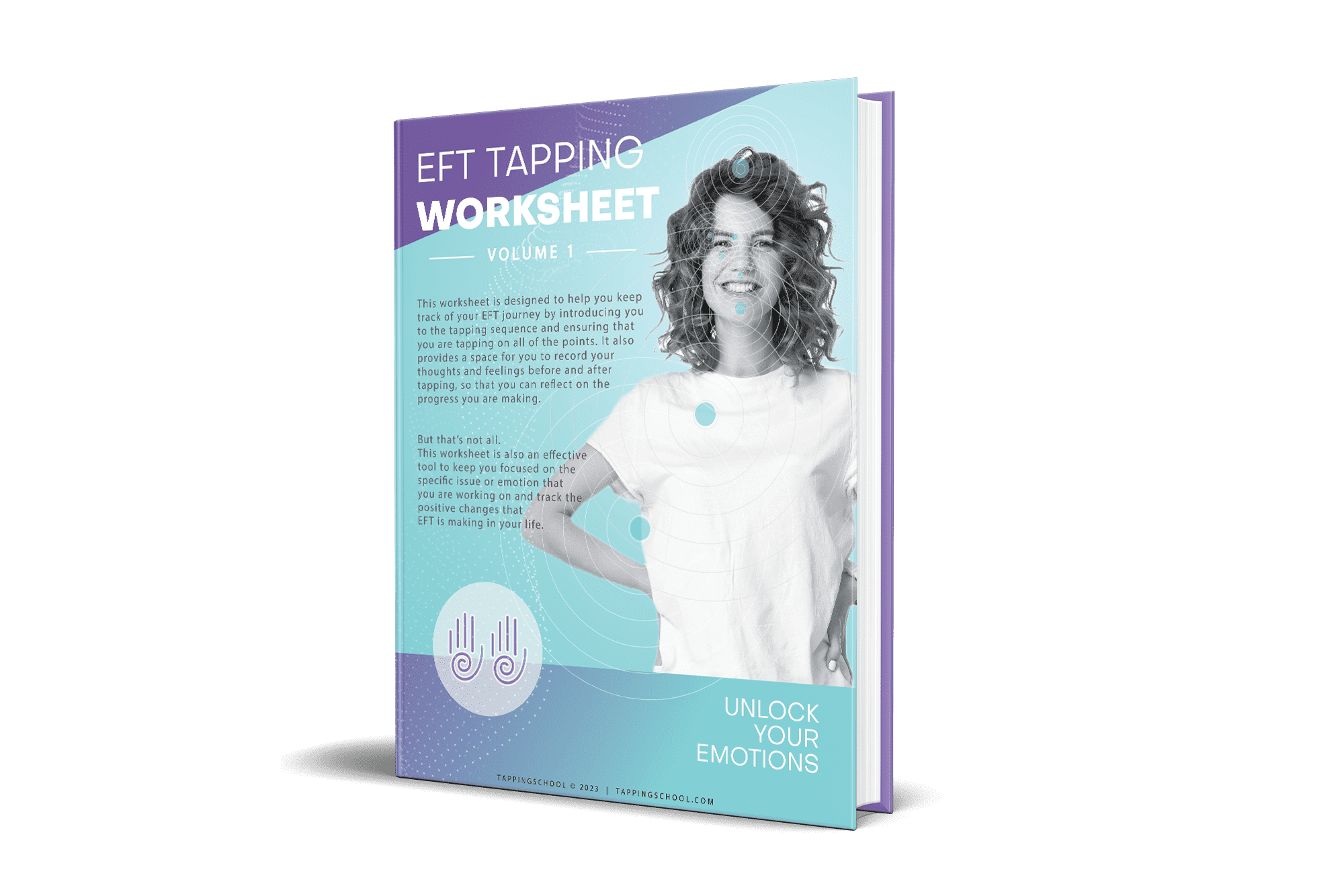What’s EFT Tapping (How It Works and Conditions It Helps)
- What’s EFT Tapping (How It Works and Conditions It Helps)
- What Is EFT Tapping?
- How does EFT Tapping work?
- Science and Research Surrounding EFT Tapping
- Signs of Positive Influence of EFT Tapping
- EFT Tapping for Specific Conditions
- EFT Tapping Weight Loss
- EFT Tapping and Depression
- EFT Tapping and PTSD
- How To Do EFT Tapping?
- The 5 steps of EFT Tapping
- Why Tap More Than One Point?
- Other Considerations Around EFT Tapping
- Resources
- EFT Tapping Worksheet
- Background of EFT Tapping
- The Benefits of EFT Compared to Other Therapy Techniques
- Incorporating EFT Tapping in your life
- Using EFT In Everyday Life
- Tapping at Work
CHAPTER 1:
What Is EFT Tapping?
In this chapter, you will learn about how EFT tapping works and where the tapping points can be located. You will also learn about the science behind EFT and the research supporting it.
Let’s get right into it!
Unfortunately, many of us are prone to stress and anxiety. While there are various methods to treat these sensations, such as meditation and deep breathing, the results can be mixed.
EFT tapping is relatively new compared to the tried-and-tested techniques often put forward by mental health experts. Like other newcomers, EFT and its techniques have experienced resistance within the medical community since its inception.
How does EFT Tapping work?
Twelve meridians are considered major meridians in Emotional Freedom Technique tapping. However, only the nine with energy points closest to the skin’s surface are generally used by patients and practitioners.
Therefore, the order in which the meridians are tapped is essential. The meridians below are listed in sequence.
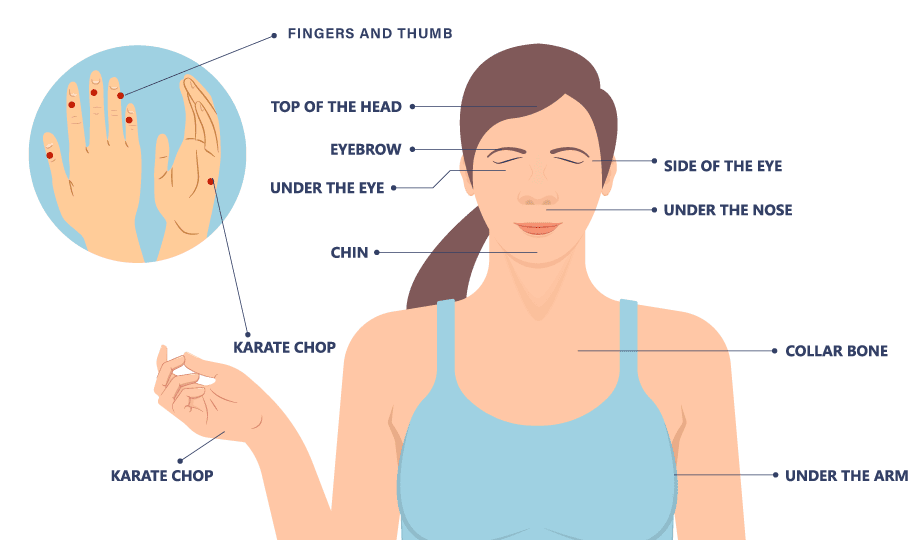
- Karate chop (KC): small intestine meridian; located on the outside of your hand in the middle of the fleshy part.
- Top of head (TH): governing vessel; located on the center top of your head.
- Eyebrow (EB): bladder meridian; located at the start of your eyebrow.
- Side of the eye (SE): gallbladder meridian; located near the end of the eyebrow on the bone point above the eye socket.
- Under the eye (UE): stomach meridian; located on the cheek under the eyebrow, in line with the center of the eye.
- Under the nose (UN): governing vessel; located under the nose just above the cupid’s bow of your top lip.
- Chin (Ch): central vessel; located in the middle point between the lower lip and chin.
- Beginning of the collarbone (CB): kidney meridian; the point where the collar bone, breastbone, and first rib converge.
- Under the arm (UA): spleen meridian; under the arm and on the ribcage, level with the nipple for men or about four inches below the armpit for women.
- Thumb (TH)
- Index finger (IF)
- Middle (MF)
- Ring finger (RF)
- Little finger (LF)
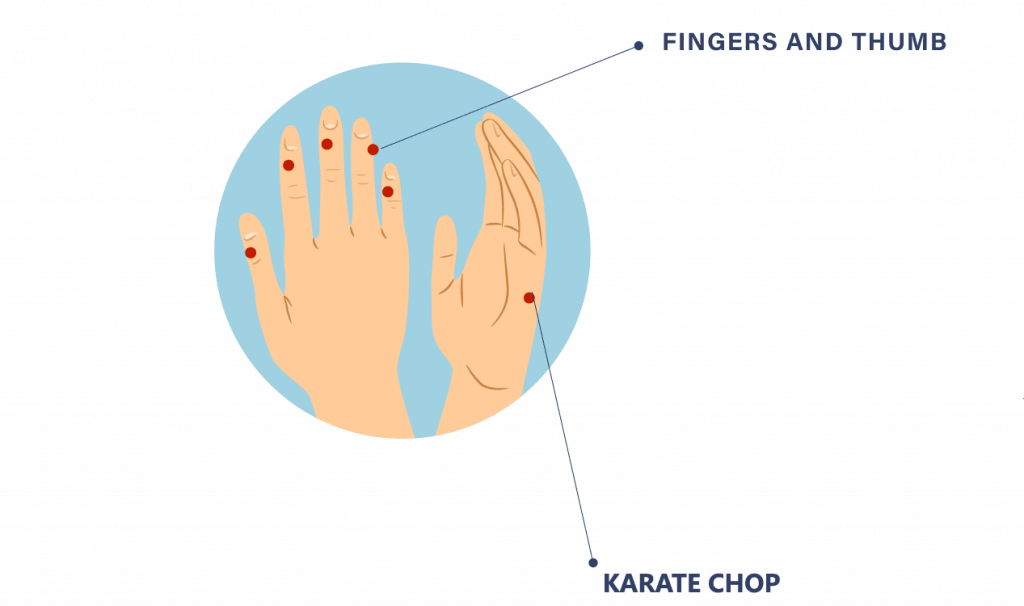
The last five points: TH, IF, MF, RF, LF: head-brain-sinuses meridian are located at the side of the base of the nail, whilst the point on the ring finger is located on the other side of the nail as shown in the picture.
Tapping on the meridian points helps to reboot the body’s energy system. EFT tapping should be used in conjunction with a mantra. Repeating the positive affirmation helps to reset the brain and decreases negative thinking.
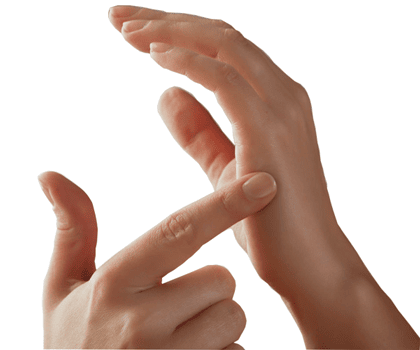
It is crucial to reset both the negative thoughts and the energy blockages. Taps or pulses on the meridian points help clear the blockages holding up the energy flow, while the affirmations reassert positive feelings.
When there are no blockages to cause a build-up of negative emotions, feelings of distress should decrease. The body’s energy flow balances our emotions, ridding the body of pent-up feelings that present as sadness, anxiety, or even real pain.
Science and Research Surrounding EFT Tapping
Emotional Freedom Technique is comparatively new, introduced relatively recently in 1995. It was and still is considered a pseudoscientific therapy technique, or what some call a fringe psychotherapeutic practice.
Despite this, recent research studies have found that many patients and practitioners successfully use EFT tapping to rebalance the body’s energy, reduce physical pain, and decrease emotional distress.
Though tapping research is limited, EFT studies have shown the most improvement in patients suffering from anxiety, depression, and PTSD.
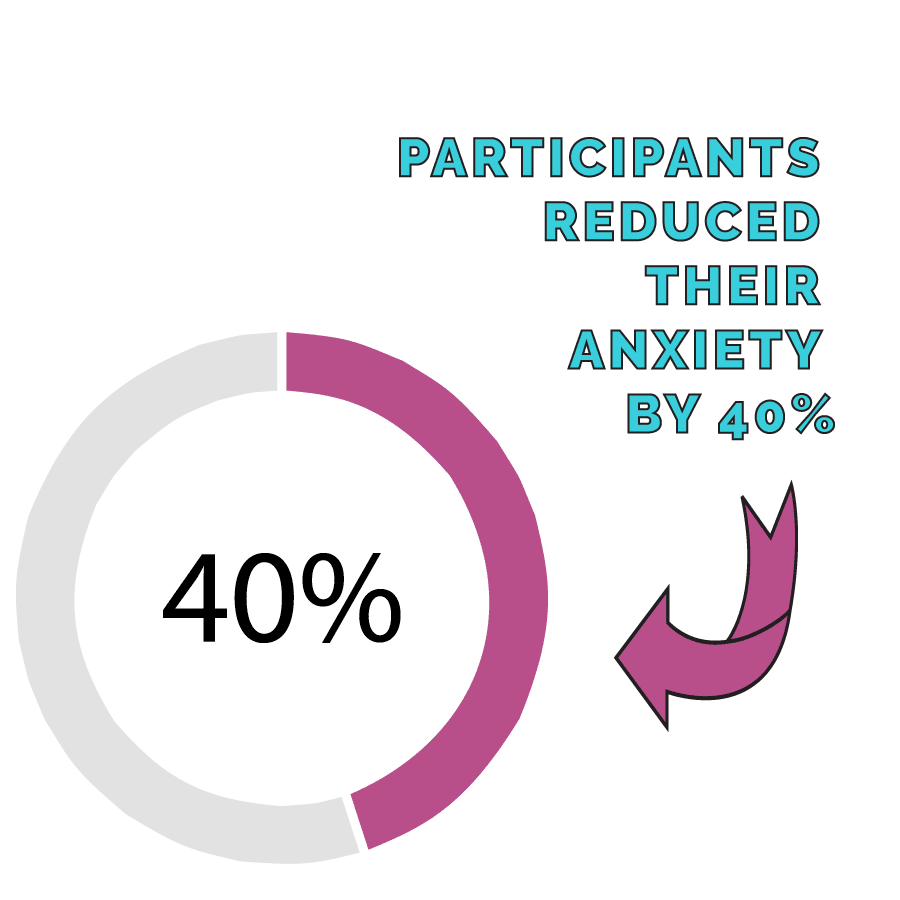
Signs of Positive Influence of EFT Tapping
The most apparent way individuals know that EFT is working is a decrease in the intensity of the emotion after completing a round of tapping.
Other benefits users may see are:
- A reduction in stress
- Decrease in anxiety
- Less physical pain
- Release muscle tension
- Increased energy
- A more positive outlook
- Lessened phobia
- Better sleep
- Lower physiological markers like heart rate and blood pressure
- A more positive aura
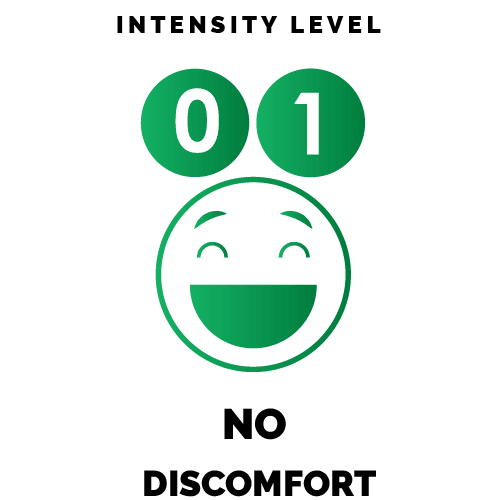
Over the years, the American Psychological Association (APA) and other journals have posted over one hundred articles on the effectiveness of EFT, most showing that it significantly reduced symptoms associated with psychological distress.
Holistic Therapy
Body-centered therapies, like yoga, acupuncture, and tai-chi, are all based on the connection between the body and mind. Practices that involve this connection, like deep breathing, have been shown to reduce stress, decrease blood pressure, and lower elevated heart rates.
Tapping is most closely related to traditional Chinese acupuncture and the belief that the body’s energy flows along specific routes.
Instead of using fine needles to stimulate the energy as it travels, pressure is used (acupressure). EFT is a unique form of acupressure that an individual or a practitioner can apply. Here is how.
Chapter 2:
EFT Tapping for Specific Conditions
This chapter will highlight the latest scientific research highlighting the effectiveness of EFT in treating conditions like anxiety, depression and PTSD. In one of the studies, the participants’ anxiety levels fell by 40%. Let’s get into it.
EFT Tapping Anxiety
What is EFT’s role in anxiety relief? Anxiety is the area on which most EFT research focuses.
EFT tapping may help patients decrease their anxiety and experience less emotional distress.
A 2016 study resulted in patients reporting a significant decrease in their anxiety symptoms, with research highlighting greatly decreased anxiety scores after using EFT tapping.
The sample population was small, but the results were reassuring. However, researchers did note that more research will need to be done to effectively compare EFT tapping therapy to long-standing therapies like cognitive behavioral therapy (CBT).
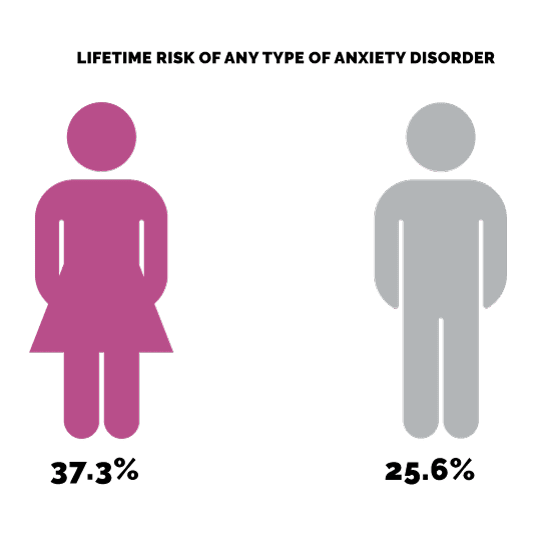
In 2019 another study was completed with a larger sample population. EFT workshops were attended by the 203 members of the study sample. A survey of their emotions and mental well-being was completed pre and post-EFT workshops. Additionally, their physical health markers were recorded before and after their session.
After completing a workshop and engaging in Emotional Freedom Techniques, participants reported lower rates of anxiety, depression, PTSD, and reduced cravings and pain. Their happiness was reported as higher than pre-workshop levels.
Their resting heart rate, blood pressure, and cortisol levels had all improved. Their decreased biomarkers positively affected their reported happiness and immune function.
A collection of research on EFT studies produced results showing that EFT tapping can be more efficacious in combating anxiety and depression than other physical interventions such as controlled, deep breathing.
Emotional Freedom Techniques have time and again shown significant reductions in emotional distress, cravings, and pain even when self-administered by patients.
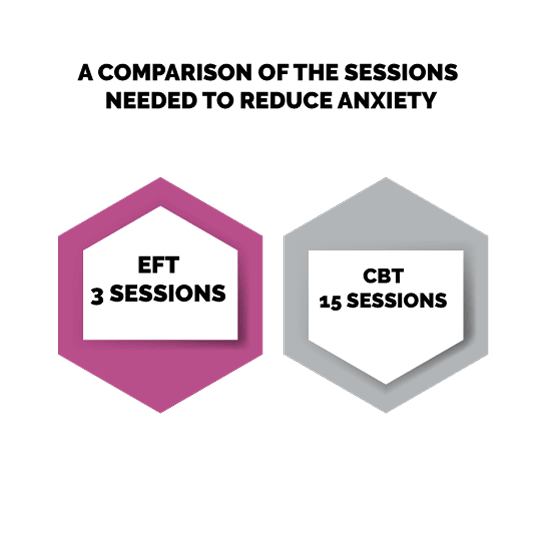
Tapping’s ability to lower angry and fear-eliciting stimuli makes it an often effective anxiety remedy.
EFT Tapping Weight Loss
In traditional Chinese medicine acupressure points are those parts of the body that are connected to energy channels that can be influenced through acupuncture. Within the world of EFT Tapping these access points are known as meridian points and there are believed to be 12 of these scattered throughout the body.
When it comes to weight loss, practitioners will pay special attention to meridian points that are related to digestion. Including:
- The ear point (appetite suppression)
- The thumb point (stimulating metabolism)
- Inner elbow (intestine function)
When there is a temptation to overeat, practitioners are encouraged to touch these areas seven times while repeating a positive statement related to weight loss (e.g., ‘I want to take care of my body’ or ‘I want to feel good in my body’)
At the very least EFT Tapping can assist practitioners to avoid mindless eating, as the physical and verbal cues will remind them of their weight loss goals and aspirations. In addition to this, the verbal affirmations can lead to a changed attitude and deeper resolve to deal with the issues underlying weight gain.

In terms of the physiological impact of tapping, it is believed that the accessing of pressure points can activate the amygdala. The regulation of fear and anxiety can be traced back to this part of the brain. By assisting in the regulation of the amygdala EFT Tapping can contribute to the lowering of cortisol, the classic stress hormone. There are undeniable links between stress and overeating and being overweight may cause stress by itself. It has also been shown that binge eating and weight gain are tied to elevated cortisol levels.
Research into the impact of pressure point therapy on obesity is ongoing but there have been some promising early results. A 2011 study of 84 overweight adolescents showed that acupressure was positively correlated with a decrease in BMI over an eight-week period. Similar results were reported by a 2019 study of 59 adults.
All the above suggests that EFT Tapping could be a useful tool in helping to curb ‘emotional eating’ and in cases where weight gain is correlated with increased levels of stress. It can do this both through the positive psychological and emotional impact of key affirmations and the improved management of negative energy in the body.
EFT Tapping and Depression
Early comparisons between EFT and CBT are promising. Another 2016 study found that CBT and EFT both reduced symptoms of depression when administered to two separate groups. The EFT tapping required more sessions to produce a positive result but was similarly effective as CBT.
Bond University completed the study out of Gold Coast, Queensland, Australia. They sampled two groups composed of ten members who had screened positive for Major Depressive Disorder (MDD). For eight weeks, the group members either completed CBT or EFT therapies. In the end, each group should have significant reductions in their negative emotions tied to MDD.
In 2019, 238 college students who scored positively for moderate to severe agreed to participate in a group EFT session. The study results found that the group who partook in the joint EFT session reported notably decreased depression scores compared to the control group.
Several other studies have found that EFT can be used to combat depression when lengthier or more costly therapies are unavailable. What is more, EFT commonly produces equal or better results than traditional depression treatments.

EFT Tapping and PTSD
PTSD, or Post Traumatic Stress Disorder, predominantly affects military members. However, it can also stem from various traumatic experiences either at the hands of humans or nature. Patients who have PTSD may find some relief by using Emotional Freedom Techniques.
In a 2018 study, researchers reported that EFT tapping produced better results for PTSD patients than psychopharmacology or traditional psychotherapies.
Members participating in group meetings, attending four to ten sessions saw psychological and physiologic improvement.

Because it can often be difficult for veterans to receive treatment for PTSD, EFT tapping can be a time-saving alternative. A 2013 study cited significantly decreased rates of stress and PTSD symptoms from those who had participated in EFT tapping instead of those who were waitlisted for standard therapy treatment. Continued use of Emotional Freedom Techniques resulted in 79.5% of people living with PTSD no longer meeting the criteria of the emotional disorder after six months of EFT treatment. This is positive news when considering the long-term benefits of EFT.
When practitioners and veterans were surveyed in 2017, each group reported high success rates in using EFT tapping to reduce the emotional distress associated with PTSD. In fact, 63% of EFT practitioners claimed they needed only ten sessions or less to resolve PTSD cases. Furthermore, under 10% of their patients saw little to no improvement.

Though these results are largely optimistic, it is still important to note that in most PTSD cases, EFT tapping was administered along with another form of conventional treatment. Nevertheless, it can be denoted that Emotional Freedom Techniques appears to be a valuable part of PTSD treatment regimens.
What makes Emotional Freedom Techniques often as or more successful than other therapies? The next chapter will dive into just that.
Chapter 3:
How To Do EFT Tapping?
Here you are going to learn about using EFT in the correct manner. You will also learn how energy travels through your body and how you can access and harness it via the meridian points.
EFT Tapping Points
Twelve meridians are considered major meridians in Emotional Freedom Technique tapping. However, only the nine with energy points closest to the skin’s surface are generally used by patients and practitioners.
Therefore, the order in which the meridians are tapped is essential. The meridians below are listed in sequence.

- Karate chop (KC): small intestine meridian; located on the outside of your hand in the middle of the fleshy part.
- Top of head (TH): governing vessel; located on the center top of your head.
- Eyebrow (EB): bladder meridian; located at the start of your eyebrow.
- Side of the eye (SE): gallbladder meridian; located near the end of the eyebrow on the bone point above the eye socket.
- Under the eye (UE): stomach meridian; located on the cheek under the eyebrow, in line with the center of the eye.
- Under the nose (UN): governing vessel; located under the nose just above the cupid’s bow of your top lip.
- Chin (Ch): central vessel; located in the middle point between the lower lip and chin.
- Beginning of the collarbone (CB): kidney meridian; the point where the collar bone, breastbone, and first rib converge.
- Under the arm (UA): spleen meridian; under the arm and on the ribcage, level with the nipple for men or about four inches below the armpit for women.
- Thumb (TH)
- Index finger (IF)
- Middle (MF)
- Ring finger (RF)
- Little finger (LF)

The last five points: TH, IF, MF, RF, LF: head-brain-sinuses meridian are located at the side of the base of the nail, whilst the point on the ring finger is located on the other side of the nail as shown in the picture.
Tapping on the meridian points helps to reboot the body’s energy system. EFT tapping should be used in conjunction with a mantra. Repeating the positive affirmation helps to reset the brain and decreases negative thinking.

It is crucial to reset both the negative thoughts and the energy blockages. Taps or pulses on the meridian points help clear the blockages holding up the energy flow, while the affirmations reassert positive feelings.
When there are no blockages to cause a build-up of negative emotions, feelings of distress should decrease. The body’s energy flow balances our emotions, ridding the body of pent-up feelings that present as sadness, anxiety, or even real pain.
EFT Tapping Sequence – Step by Step
Before you get started, you need to familiarize yourself with the EFT tapping points. We covered this above in the section discussing the nine meridians. In the beginning, it can be helpful to have images or diagrams of the meridians close at hand for easy reference.

The 5 steps of EFT Tapping
When you are ready to begin, follow these steps.
Step 1: Identify the Issue(s)
The first step is to identify the root cause or the issue and recognize its emotions. The issue might be PTSD, a specific phobia, or even chronic pain. Examples of the emotions tied to these experiences or illnesses could be stress, anger, or sadness. It can be common to experience more than one emotion associated with the issue.
Step 2: Rate the issue(s) and Their Intensity
If you are dealing with various emotions, try to focus on the most intense. Then, rate that intensity using a scale from zero to ten, with ten being the most intense and zero being no intensity.
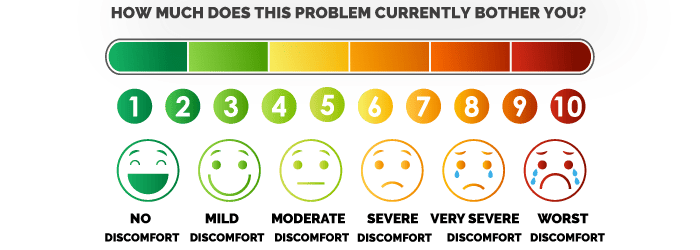
Step 3: Build Your Set-Up Statements
Setup statements are positive affirmations. They center around acknowledging the emotion and then meeting it with a reaffirming statement. A standard setup structure can be used to ensure you are both admitting the emotion and countering it with positive energy.
The common structure is broken into two parts. The first part begins with “Even though…” and is followed by recognizing the emotion and issue. For example, “Even though I am nervous about entering the water…” or “Even though I feel depressed that my career trajectory is not going the way I want…”.
Next, move on to the second part, which relates to acceptance, affirmation, and good energy. Tailor your statement and focus on speaking your positivity into existence. For example, “I am safe and relaxed right now” or “I fully accept myself, and I am worthy.”
Once you put them together, your setup statement should read something like “Even though I am nervous about entering the water, I am safe and relaxed right now” or “Even though I feel depressed that my career trajectory is not going the way I want, I fully accept myself, and I am worthy.”
Step 4: Complete the Tapping Sequence While Repeating Your Affirmations
Take a moment to center yourself and breathe deeply before starting the tapping sequence. Follow the order of the meridian points. Usually, it starts with the point on the outer edge of the hand(karate chop KC). From there, it works downwards from the top of your body with your head to your underarm, begin tapping. You will need to use one hand for the first point. Points two through six can utilize both hands. Tap rhythmically and firmly, but not hard. Similar to tapping your fingers on a table.
While tapping karate chop point, repeat your setup statement three times. Then, move to the next point. After the first point, some individuals only need to repeat a reminder phrase. Often, this is a variation of their setup statement or just the first part. You may discover that specific points feel more “charged” than others. At least seven taps on each point is a good amount.
Tap each following points:
· eyebrow,
· side of the eye,
· under the eye,
· under the nose,
· chin,
· beginning of the collarbone, and,
· under the arm,
· fingers and thumb.
Once you make your way through all the points, you have completed around. Some patients feel better after one round; others may need up to five rounds. The next step will help you determine if you need additional rounds.
Step 5: Repeat the Intensity Rating
Once you have completed one round, rate the intensity again. If your intensity has decreased to an acceptable level, you have completed a session. If you do not feel a significant change, complete as many rounds as needed to lower the intensity to near or equal to zero.
It is perfectly normal to experience a range of physical and emotional sensations like yawning or tingling in the body. This is usually a positive sign that your body is releasing trapped energy.
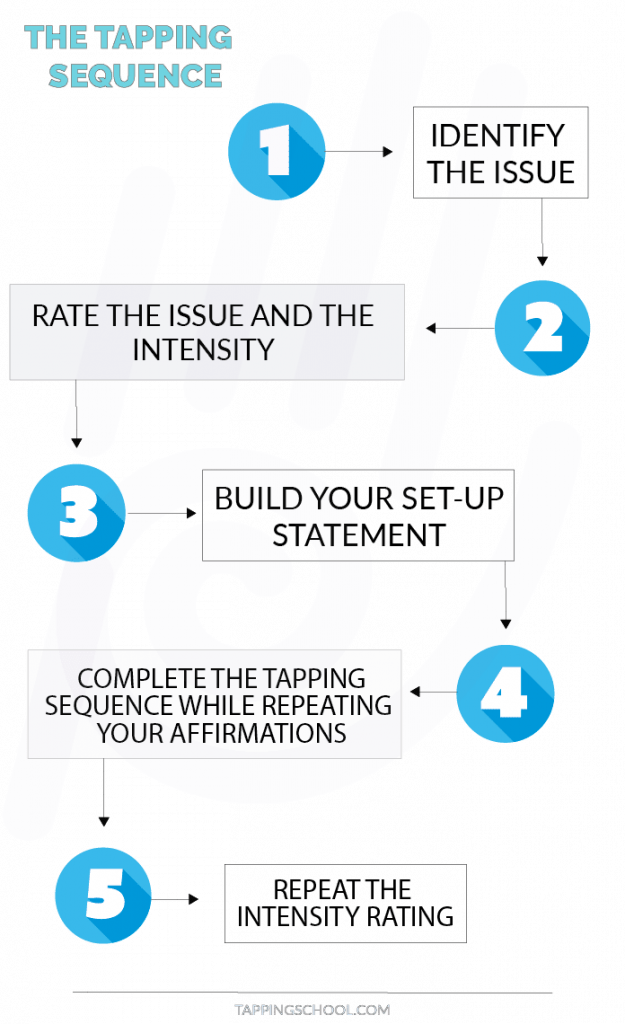
The 9 Gamut Procedure
While perhaps one of the most exciting techniques of EFT, the 9 gamut procedure is beneficial when dealing with a powerful emotional issue or a stubborn one that refuses to decrease in intensity after a few basic rounds of tapping.
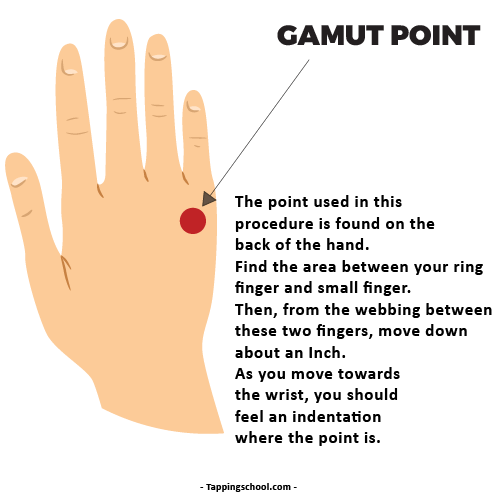
The point used in this procedure is found on the back of the hand. Find the area between your ring finger and middle finger. Then, from the webbing between these two fingers, move down about an inch. As you move towards the wrist, you should feel an indentation where the point is. This spot is called the Triple Warmer meridian.
Next, you will complete a sequence of movements using your eyes, voice, and breath.
- Close your eyes momentarily (1-3 seconds)
- Open your eyes
- Focusing straight ahead, move your eyes down to the right
- Without moving your head, move your eyes down to the left
- In a clockwise direction, roll your eyes in a complete circle, mentally following each number on a clock
- Repeat this process but moving counterclockwise slowly with your eyes
- For five seconds, hum the tune of any song you think of
- Out loud, count to five
- Hum five seconds of any song like the happy birthday song
Breathe deeply and take a moment to assess how you are feeling.
What are the gamut point benefits, and why does it work?
It is essential to understand that the 9 gamut procedure uses two different stimulation types. The first is the mind-body connection made through tapping. The second, which involves eye rolls, humming, and counting, stimulates both sides of the brain. When you look hard to the right, the left hemisphere of your brain activates, and vice versa for the other direction. This bilateral stimulation works to make a cohesive experience for your “whole brain.”
When you pair bilateral hemisphere stimulation with the Triple Warmer meridian, which helps to negate our body’s fight or flight response, your energy goes through a total rebalance. The reset has an all-over relieving effect, both psychologically and physically.
The 9 gamut procedure can be used independently or in conjunction with a full round of basic EFT tapping. Once you get it down, it is relatively quick and straightforward to complete. Its ability to fully reset our energy paths and emotional response make it an effective technique to use whenever you are feeling intensely threatened, overwhelmed, or stressed.
What Should I Say During EFT Tapping?
An integral part of EFT Tapping is the use of key phrases or affirmations to be said while the physical intervention (tapping) takes place. This inevitably leads to a follow-up question, namely what to actually say during EFT Tapping.

On some level this is a very easy question to answer. Those who are at the beginning stages of EFT Tapping can just use a basic fill-in-the-blank setup phrase. Something like: ‘Even though I have this……………., I deeply and completely accept myself’. Of course, the dots will have to be replaced with whatever it is that you are dealing with, e.g., ‘this pain’, ‘this desire to overeat’, ‘this anxiety’ etc.
Although it is true that basic phrase construction is simple, more benefit can be gained from being as specific as possible. This means that the problem that is being addressed is described in as much detail as possible. For example, in the case of physical pain you can say something like this: “Even though when I bend my knee, I feel so much pain that I can barely think, I deeply and completely accept myself.”
The statement above can be described as a setup phrase, one that you use at the beginning of the tapping process. Practitioners also use a reminder phrase, a shorter statement that are used when the acupressure points are tapped. In the case of the example above, it could be something like ‘Pain so bad I cannot think’. Repeating this phrase keeps your brain focussed, rather than flitting to other feelings and thoughts.
Experienced EFT Tapping practitioners believe that more comprehensive and accurate descriptions can lead to quicker improvements. One way to get to more specific language is to think how you would describe the issue that you are dealing with to a friend and then using the phrases that you come up with. Having said that, it is probably more important to dig into underlying issues to find a better focus for your tapping than it is to work hard to find the ‘perfect’ language.
When constructing phrases, it is important that the focus stays on you, and that it does not get shifted to another person. The following is an unhelpful setup phrase: “Even though my father is mean to me, I deeply and completely accept myself”.
Another pitfall to avoid when coming up with EFT Tapping phrases, is the tendency to stray into ‘global language’. This is where the tapping phrase deal with issues that are beyond your body and direct personal circumstances. World events and societal challenges do not fit in this category. So don’t start with “Even though there is a war in Ukraine…” You can, however, legitimately focus on how the conflict is affecting you personally (e.g., through triggering PTSD).
What should be clear from the above is that words matter. This includes the words that we choose to use during EFT Tapping. When we choose wisely, specifically in terms of accurately describing the issues that we need to address, this can have a significant impact on overall improvement and recovery rates.
Why Tap More Than One Point?
Our bodies are intuitive; they know when we have a blocked energy point and will work to rebalance our system. Frequently, this means diverting energy through another point or path. While this may help circumvent the blockage, we must then reset the system when we clear the problem.
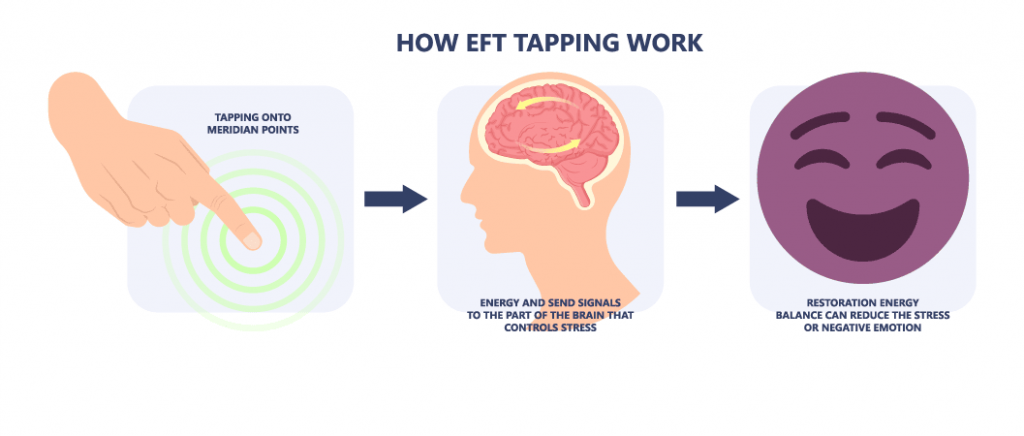
Instead of focusing just on the root of the problem, EFT tapping takes a holistic approach. Much like a medical doctor will not only treat a runny nose but also take a look at a sore throat or an upset stomach that could be caused by nasal drainage, EFT tapping strives to fix auxiliary issues as well as the chief problem.
Overlapping or tapping more points than needed will not do any harm. In fact, it might do you a world of good. However, we are not always wholly sure where blockages are forming or which energy points might be fuzzy. Therefore, it is better to move through the entire body, completing the tapping process to double-check that each and every meridian point is in working order.
Tapping, the foundation of Emotional Freedom Techniques, has had great success in reducing symptoms of emotional distress. The following section will highlight EFT’s positive benefits as reported in research studies from recent years.
Several other studies have found that EFT can be used to combat depression when lengthier or more costly therapies are unavailable. What is more, EFT commonly produces equal or better results than traditional depression treatments.

CHAPTER 4:
Other Considerations Around EFT Tapping
Here you going to learn about the potential side effects of EFT. Excited? Let’s get to it.
Why EFT Tapping Should be Avoided
While many people can derive great benefit from the Emotional Freedom Technique (EFT) and tapping, there are some situations where it is best avoided. Not because the technique is ineffective or harmful in itself, but mainly because some other interventions may be more helpful under the circumstances.
Some reasons to avoid EFT Tapping include the following:
Traditional medical interventionsare necessary. Tapping does not eliminate the need for proper diagnosis and treatment of health problems. If you are seriously ill (e.g., suffering from heart failure or cancer) it is obviously not advisable to try and ‘tap away’ the problem. Instead, it is of the utmost importance that you get a proper diagnosis and treatment.
Tapping should not be used as an excuse to ‘sweep issues under the carpet’. A frequent criticism of tapping is that some practitioners seem to believe that it absolves them from the need to patiently work through some of the relational and personal issues that they are dealing with. Yes, affirmations can be powerful but sometimes we also need to think through, and talk about, the challenges that we are facing. Tapping should, therefore, be seen as a very useful additional tool in our journeys towards healing and wholeness and not as a silver bullet.

Not everyone is ready for the emotions that may be awakened by tapping. For others the problem is not superficiality but the exact opposite. Sometimes tapping can cause people to be reminded of certain circumstances or events that are perceived as deeply traumatic. When this happens practitioners may be confronted by a range of negative emotions. This can lead to disillusionment as it might seem that the very thing that was supposed to help them is making things worse. However, the key will be to deal with these emotions in a healthy and transformative way so that they becomesteppingstones on the road to healing rather than roadblocks.
Tapping can sometimes lead to unthinking passivity. Another danger associated with tapping is that some practitioners may begin to think of the affirmations associated with it as a kind of mantra that will magically solve all their issues. There are, of course, no magic involved with tapping and practitioners are encouraged to think through their challenges and to deal with them in intelligent and informed ways. Tapping should, therefore, not be seen as an excuse tohand over responsibility for making wise decisions and to seek to make improvements to our lives where we can.
Tapping requires long-term, sustained, commitment. Tapping is not a ‘quick fix’ and those who treat it like this may be deeply disappointed at the lack of results. It may, therefore, be better to avoid EFT Tapping if you are simply after ‘the next big thing’.
While all the above factors may perhaps represent good reasons to avoid tapping, they should not scare us away from a technique that can be very powerful when properly understood and applied. It is, therefore, very important to remind participants that they should engage in it for the right reasons and in the right way.
EFT Tapping Side Effects
When discussing any treatment or intervention, it is customary to look at its side-effects. The first thing that should be noted in this regard is that EFT Tapping is very safe and non-invasive. Physical side-effects are, therefore, virtually unheard of.
It is, however, sometimes the case that some practitioners may feel overwhelmed and overcome by negative emotions after engaging in a tapping session. To a certain extent such reactions can be described as emotional side-effects.

Before we launch into a discussion of potential emotional side-effects it is important to note that much of what will be profiled is based on anecdotal evidence, primarily reports from practitioners. Much more research into this area is needed.
Perhaps the most significant self-reported side effect of ETT Tapping is that people sometimes feel worse after a session. Some practitioners report anger, anxiety, unease, melancholy, or even a temporary exacerbation of symptoms.
The fact that these negative experiences sometimes occur in a minority of cases does not mean that EFT Tapping is best avoided. It is, instead, important to try and understand why this happens. Here are a few possible explanations:
- You have not reached the core of the issue yet. It is possible that you are dealing with a very complex problem that will require much work. Negative feelings may simply be an indication that more work needs to be done to ‘get to the bottom’ of whatever it is that you are dealing with.
- You cannot do this alone. Negative emotions may also be an indication that you need help. This can involve engaging a professional practitioner (if you are tapping on your own), or that you may need to lean more on those in your life who are willing and able to assist with whatever it is that you are dealing with. This can, of course, include professional counsellors.
- You have been reminded of trauma and hurt. Tapping can often lead to deep reflection on what caused issues in the first place. In the process you may be reminded of things that you would have liked to stay in the past. This can, of course, be very confronting. Much sensitivity and wisdom are needed in dealing with this kind of scenario and it would be wise to engage outside help if facing the past in this way is proving to be very challenging.
- You may fear what lies ahead. Sometimes we are so ‘used’ to the challenges we face that they almost become part of our identity. So, we may paradoxically fear the fact of leaving them behind and heading into a new future. Being gentle with ourselves in facing such fears will be a key part of overcoming them.
As mentioned above EFT Tapping is not associated with significant side-effects. However, the self-reporting of negative experiences deserves our attention. Although more research is needed, this phenomenon points to the fact that we should work hard to understand the underlying causes of negative experiences so that these can be addressed in the interests of long-term recovery.
CHAPTER 5:
Resources
This chapter will contain a tapping chart and tapping worksheet to help you navigate through the EFT sessions. Let’s dive in
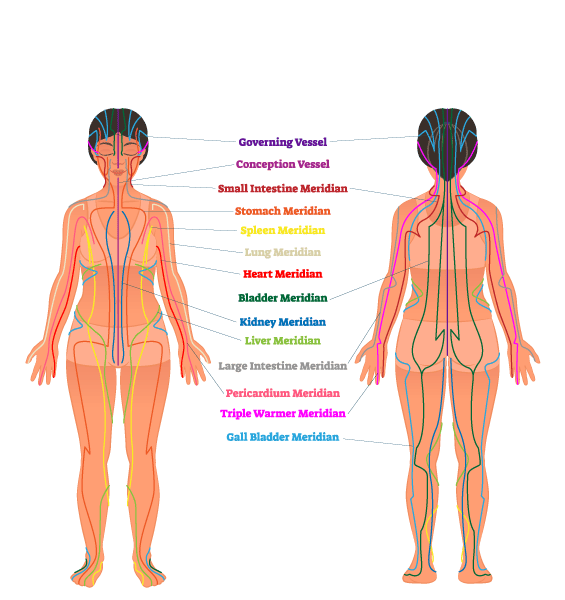
EFT Tapping Chart
When you are about to divulge into the world of EFT, it can be a bit confusing. That’s why is good to have pocked sized printout as a point of reference. Below you can download an easy-to-follow EFT tapping Chart that will take you from setting up the statement, and remind you of the tapping points sequence and gamut procedure.
EFT Tapping Worksheet
In addition to EFT tapping chart, the worksheet makes it easy to write the issue or problem down that you want to work on and keep a record of its intensity after completing each EFT session. This is essential for you to track your progress and improve your wellbeing. You can download EFT tapping worksheet below.
FREE WORKSHEET
EASY-TO-FOLLOW
EFT TAPPING WORKSHEET
This is essential for you to get results
CHAPTER 6:
Background of EFT Tapping
In this chapter, you’re going to learn about Gary Craig and Dr. Callahan’s Thought Field Therapy (TFT) and learn how it all started. Also, you’re going to discover the benefits of EFT in comparison to other, conventional therapies.
Let’s get right into it!
The Origin of EFT Tapping
EFT stemmed from the techniques pioneered in the 1970s by doctors interested in the connection between acupressure points and specific emotional issues, such as anxiety and phobias.

One doctor, Dr. Roger Callahan, is credited with developing Thought Field Therapy (TFT). Through his research, he proposed that our bodies have energy points, which he termed meridian points, points that hold unique connections to our minds. Stimulating these points by tapping on them can help treat trauma, stress, PTSD, and a host of other ailments.
Dr. Callahan’s TFT approach was very involved and tailored to the patient.field therapy One of Dr. Callahan’s understudies, Dr. Gary Craig, desired to make tapping more available and approachable. After simplifying the technique and changing the name, Craig introduced Emotional Freedom Technique or EFT to the public in the 1990s.

His process was very similar to Callahan’s. The fundamentals of EFT are that the human body has a constant flow of energy within it. Emotional distress, like anxiety, can disrupt energy circulation, essentially blocking it.
The blockages can be accessed through the specific meridian or energy points found on the body. Pressure is applied in a steady tapping motion on the meridians while the person focuses on the negative feelings to restore energy balance.
The simultaneous tapping and attention on the emotions restores the balance of energy and lowers the feelings of emotional upset.
The American Psychological Association continues to update its standing on the use of EFT though as of 2018, EFT had not yet been endorsed by the APA.
However, many experts, psychologists, and users have had success with this technique. Additionally, its foundation has roots in ancient philosophies that have been proven with time.
The Benefits of EFT Compared to Other Therapy Techniques
The mind-body connection has been used for centuries. However, believing in the link between body and mind is essential for EFT tapping to work. Acceptance of the idea that a disrupted flow of energy through our body can lead to emotions of anxiousness, sadness, and negativity is imperative. What blocks or disrupts that energy path?

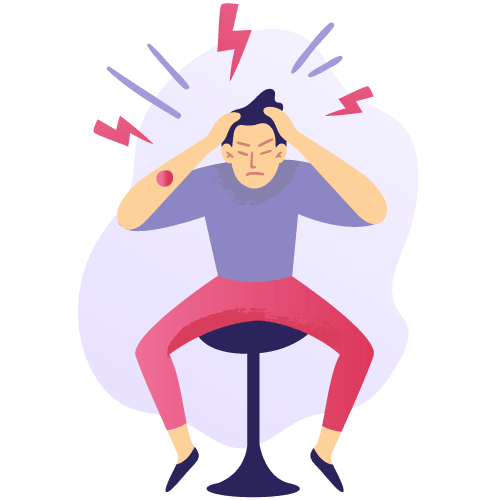
An experience or memory is often to blame for anxiety, stress, and sadness. When we go through something upsetting, our body’s energy circuit is disrupted. If we continue to dwell on the experience, the disruption becomes a blockage, and that blockage leads to the distressing emotions we feel.
The bruise analogy is helpful in understanding how EFT tapping works. A bruise can be likened to a traumatic event or phobia. Repeatedly pressing on the tender bruise causes more and more pain, similar to how talking about an emotion or issue often leads to reliving the pain. Going over the feeling, again and again, is simply further blocking the disrupted energy flow. Removing the blockage and releasing stored energy does not cause additional pain and allows for healing as it travels through the body. Repeating a positive mantra disperses the cynical emotions while tapping clears the block.
Tapping may seem new and innovative, but this type of therapy has led to breakthroughs for many patients who had little to no success with conventional treatments.
Talk therapy involves explicitly rehashing a traumatic event or experience. Discussing the negative emotions associated with the event can create emotional distress and resistance. EFT takes a different approach.
Instead of focusing on the negative, EFT simply acknowledges the feeling. Patients are asked to recognize the event or phobia but not dwell on it. Instead, they should repeat a positive mantra.
These affirmations come from Neuro-Linguistic Programming or NLP-based therapy. NLP emphasizes how words and language are connected to habits and behaviors; and the use of one to influence the other.
Repeating these affirmations while tapping on the meridian points clears negative energy and, in turn, reduces emotional distress instead of focusing on the negative and increasing emotional stress.
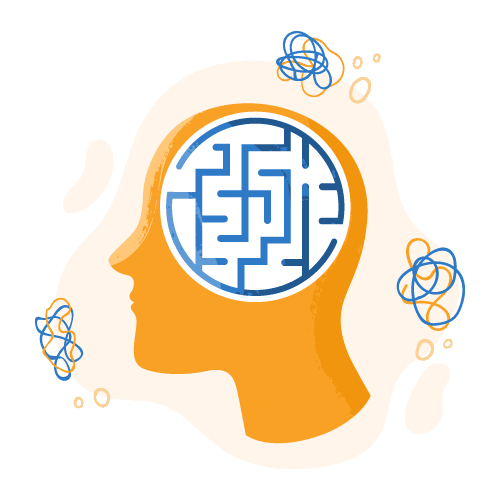
Patients who use EFT tapping tend to appreciate that it is non-pharmacological and non-invasive when compared to other therapies. Furthermore, it can be easier to gain access to EFT therapy and more affordable and can be self-administered by the patient.
EFT tapping can be a powerful tool to use with other therapies. In most cases, a practitioner can teach you how to use it in a single session so that you can incorporate it into your treatment as necessary.
In the next section, a basic EFT tapping procedure will be outlined, allowing you to see for yourself the user-friendliness of the technique.
Holistic Therapy and EFT Tapping
Body-centered therapies, like yoga, acupuncture, and tai-chi, are all based on the connection between the body and mind. Practices that involve this connection, like deep breathing, have been shown to reduce stress, decrease blood pressure, and lower elevated heart rates.
Tapping is most closely related to traditional Chinese acupuncture and the belief that the body’s energy flows along specific routes.
Instead of using fine needles to stimulate the energy as it travels, pressure is used (acupressure). EFT is a unique form of acupressure that an individual or a practitioner can apply. Here is how.
CHAPTER 7:
Incorporating EFT Tapping in your life
Here you are going to learn about how you can apply this proven technique to your life and improve every aspect of your wellbeing. You will also learn how to help your friends or family members release static energy or emotions.
Using EFT In Everyday Life
EFT tapping for stress, pain, or anxiety is a wonderful self-healing tool that can be relied upon throughout your daily life.
Many situations in our day can trigger stress, anxiety, and sometimes physical pain. Using EFT techniques can help.
Say you are facing a deadline at work. This situation could trigger stress that leads to negative emotions and painful tension.

Tapping at Work
Tapping can be completed at your desk whenever you feel negative emotions. Your statement should identify the issue, a work deadline, and then impart an affirmation.
For example, “Even though I feel stressed about this deadline, I honor my feelings, and I allow myself to relax.”
Other situations, like anxiety about an upcoming event or low self-esteem due to an experience, are excellent candidates for EFT tapping too.
Suppose you have anxiety about returning to work and social activities.
In that case, you may want to say, “Even though I feel anxious about returning to the community and work, I accept myself, and I am safe right now .”
Low self-esteem and the negative feelings associated with it can be combated with statements like, “Even though I feel unworthy after my partner broke up with me, I completely accept myself, and I am releasing my past.”

You will want to follow the procedure for EFT tapping, including identifying the issue, rating the intensity, setting up your statement, and then repeating the affirmation as you complete a round of tapping.
Though tapping may work best when you have a moment of solitude, undisturbed, do not underestimate using the technique at your desk, in your car, or wherever you can find a moment of solace to restore balance to your energy and release blockages.
CHAPTER 8:
Final Thoughts
EFT is an effective tool in the uncertain world that we’re living in. In this chapter, you will learn what you can expect from it. Let’s dive right in.
Emotional Freedom Techniques tapping is a beneficial tool for those suffering from a plethora of conditions. Individuals facing stress, anxiety, depression, PTSD, and chronic pain have successfully incorporated this straightforward routine into their therapy treatments.
How simple is EFT?
- Learn the meridian points
- Identify the issue
- Rate the intensity
- Create a setup statement
- Complete a round of tapping with your affirmation
- Reassess
Working with a certified EFT practitioner can help you learn the sequence quickly and effectively.
What can you expect if you decide to use EFT tapping?
- Reduced stress and anxiety
- Lower biological markers like resting heart rate and blood pressure
- Improved mood and aura
- Less physical pain
- Increased energy
EFT is gaining traction in the mental health community. More and more studies are proving its efficacy. Are you interested in trying EFT, or do you want to know more?
I would love to hear from you in the comments!
References:
- Bach D, Groesbeck G, Stapleton P, Sims R, Blickheuser K, Church D. Clinical EFT (Emotional Freedom Techniques) Improves Multiple Physiological Markers of Health. J Evid Based Integr Med. 2019;24:2515690X18823691.
- Christina D, Panagiotis K, Liza V, George CP. Stress management for the treatment of sleep disorders in lawyers: Pilot experimental study in Athens, Hellas. Journal of Sleep Disorders: Treatment and Care. 2016; 5(2).
- Church D, Brooks AJ. The effect of a brief EFT (Emotional Freedom Techniques) self-intervention on anxiety, depression, pain, and cravings in healthcare workers. Integr Med Clin J. 2010;9(5):40–44.
- Clond M. Emotional Freedom Techniques for Anxiety: A Systematic Review With Meta-analysis. J Nerv Ment Dis. 2016;204(5):388-395.
- Lee JH, Chung SY, Kim JW. A comparison of Emotional Freedom Techniques–Insomnia (EFT-I) and Sleep Hygiene Education (SHE) in a geriatric population: A randomized controlled trial. Energy Psychology: Theory, Research, and Treatment. 2015;7(1):1–8.
